 Image search results - "rain" Image search results - "rain" |
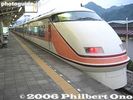
Tobu Line train to Nikko. It takes about 2 hours from Asakusa, Tokyo.
|
|

JR Chiba Station and Yokosuka Line
|
|

Torokko train at Arashiyama for Hozu Gorge
|
|

Keisei Narita Station. Getting to Narita is cheaper via Keisei Railway.
|
|

JR Kofu Station
|
|
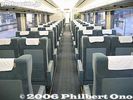
Inside Tobu Line train
|
|
|

JR Chiba Station platform
|
|

Keisei Narita StationThe Narita City Hall can be seen with the green, temple-like roof.
|
|
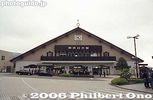
Tobu Nikko Station 東武日光駅
|
|
|

JR Chiba Station
|
|

JR Narita Station
|
|
|

JR Chiba Station
|
|

Hozu River
|
|

Hozu Gorge
|
|
|

Train station platform
|
|

Shooting the rapids
|
|

JR Okaya Station. There is no tourist info office here.Small station, but close to Lake Suwa.
|
|

JR Kami-Suwa Station
|
|

Musa-juku was the sixty-sixth of the sixty-nine stations or shukuba post towns on the Nakasendo Road. It is the seventh Nakasendo station in Shiga (following Echigawa-juku in Aisho). MAPMusa was one of ten Nakasendo stations in Shiga. There is very little left. Near Ohmi Railways Musa Station, a short ride from Omi-Hachiman.
|
|
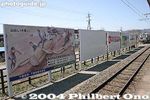
Billboard depicting Ki-otoshi (Log Drop) at Shimosuwa Station.
|
|

Aizu-Wakamatsu Station 会津若松駅
|
|

Tokyo and the Kanto region's largest tulip field attains full bloom every mid-April. The Tulip Matsuri Festival is held for about 10 days, covering two weekends. It comes on the heels of Hamura's Sakura Matsuri held in early April along the Tamagawa River. On the weekend, free shuttle buses from Hamura Station take you to the tulip field. Closest station is Hamura Station (East Entrance) on the JR Ome Line. 羽村駅
|
|

Ogre on the train
|
|

Ohmi Railways Toyosato Station. MAP
|
|

From the Ohmi Railways' Gokasho Station, you can walk to the Fujii Hikoshiro House (藤井 彦四郎邸), which is also a history museum, and to the modern Ohmi Merchant Museum (近江商人博物館).Ohmi Railways Gokasho Station 近江鉄道五箇所駅
|
|

Entrance road to JRA (Japan Racing Association) Ritto Training Center. MAP
|
|

JR Okaya Station platform. JR岡谷駅
|
|

Takahata Fudo Station, Keio Line 高幡不動駅
|
|

JR Okutama Station 奥多摩駅
|
|

Mt. Fuji as seen from the train on the Itsukaichi Line in Akiruno.
|
|

JR Takaoka Station (north side) 高岡駅
|
|

Horyuji Station, under construction in Mar. 2007 法隆寺駅
|
|

Konomiya Shrine holds the Hadaka (Naked or Nude) Festival in early March, or Jan. 13 of the lunar calendar. Men in loincloths parade around the streets until they reach the shrine.A Sacred Man (Shin-otoko) also appears in the shrine and the men try to touch him before he slips into the shrine's window. The festival's real name is Naoi-shinji 儺追神事 which is a rite to dispel bad luck. Photo: Nearest station is JR Inazawa Station on the Tokaido Line. 稲沢駅
|
|

The old JR Takayama Station. This building has been replaced by a new one. 高山駅
|
|

JR Niigata Station 新潟駅
|
|

JR Ryogoku Station platform for the Sobu Line.
|
|

Tagata Jinja-mae Station on Meitetsu Railways' Komaki Line, a few stops from Inuyama Station. The shrine is a 10 min. walk from the train station.
|
|

Kyoto Station
|
|
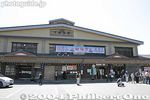
Shimosuwa Station 下諏訪駅
|
|

Aizu-Wakamatsu Station 会津若松駅
|
|

Hamura Station (West Entrance) on the JR Ome Line.
|
|

Ogre posing
|
|

Seibu Ikebukuro Line train with shibazakura design.
|
|

Inside Toyosato Station.
|
|

You can buy a set of tickets to all four Omi merchant homes and the museum which cheaper than buying a ticket at each place. Ohmi Railways Gokasho Station 近江鉄道五箇所駅
|
|

Kachidoki (Victory) Bridge with race horse motif.
|
|

JR Okaya Station platform
|
|

JR Okutama Station 奥多摩駅
|
|

Approaching Musashi-Itsukaichi Station
|
|

Inside Takaoka Station passage
|
|

Horyuji Station platform
|
|

JR Takayama Station
|
|

Niigata Station
|
|
|

Kyoto Station
|
|
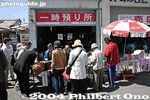
Store your luggage here. Not enough lockers at the train station so they provide this service. 400 yen/day.
|
|

Aizu-Wakamatsu Station 会津若松駅
|
|

On the weekends, free shuttle bus to the tulip festival from Hamura Station West Exit. It's short bus ride.
|
|

Seibu Ikebukuro Line Yokoze Station. Get off here for an easy walk to Hitsujiyama Park where the Shibazakura moss pink hill is. A tourist info office is on the left. 西武池袋線横瀬駅
|
|

Most take the train from Arashiyama, then ride the boat back.
|
|
|
|

Ohmi Railways Gokasho Station, waiting room.
|
|

Bridge sidewalk.
|
|

View from train station overpass
|
|

JR Okutama Station 奥多摩駅
|
|

Approaching Musashi-Itsukaichi Station
|
|

In front of JR Takaoka Station (north side)
|
|

JR Ryogoku Station 両国駅
|
|

Turnstile at JR Takayama Station
|
|

Road in front of Niigata Station
|
|

Aizu-Wakamatsu Station at twilight
|
|

You can buy a park entry ticket (300 yen) at a booth in front of Yokoze Station. Maps also available. Underpass at Yokoze Station.
|
|

End of the gorge
|
|
|

Ohmi Railways Gokasho Station building as seen from the train platform.
|
|

Kachidoki Bridge
|
|

Okutama Station at night
|
|

JR Musashi-Itsukaichi Station on the Itsukaichi Line
|
|

JR Ryogoku Station. This part of the station building is now a beer hall. The train station entrance has moved to the right of this.
|
|

Sculpture in front of Takaoka Station (north side)
|
|

Waiting room at JR Takayama Station
|
|
|
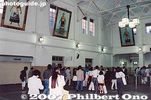
Old entrance to Ryogoku Station with a high ceiling and giant portraits of sumo wrestlers.
|
|

Aizu-Wakamatsu Station
|
|

Kameoka Station
|
|

Ohmi Railways Gokasho Station train platform.
|
|

Map of Ritto Training Center. Horse stables dominate the area.
|
|

2nd floor of Okutama Station has a gallery and soba shop
|
|

JR Musashi-Itsukaichi Station on the Itsukaichi Line
|
|

Sculpture in front of Takaoka Station (north side)
|
|

JR Takayama Station
|
|

Byakkotai statue at Aizu-Wakamatsu Station
|
|
|
|

Welcome to the JRA office, where the free 90 min. (1 pm - 2:30 pm) tour starts. (Reservations by phone required.)
|
|

Okutama Station platform
|
|

In front of JR Musashi-Itsukaichi Station
|
|

JR Takaoka Station (south side)
|
|

Present entrance to Ryogoku Station (during spring festival).
|
|

JR Takayama Station
|
|

Entrance to pedestrian underpass in front of Aizu-Wakamatsu Station
|
|

Toyosato Station platform.
|
|

24-hour strict security in place. Since 1969, the government-run Japan Racing Association (JRA) has trained jockeys and race horses in Ritto. It offers free tours of this large, impressive facility on Sunday afternoons and early Wednesday mornings.
|
|

In front of JR Musashi-Itsukaichi Station (bus stops)
|
|

Ryogoku Station exit. Only one sumo portait hangs here.
|
|

JR Takayama Station, tourist info office on left.
|
|

Entrance to pedestrian underpass in front of Aizu-Wakamatsu Station with Byakkotai (White tiger) painting
|
|
|

Starting gate training ground.
|
|

Many attractions are within walking distance from JR Takayama Station.
|
|

Hi-color town bus, very convenient and cheap (500 yen for a day pass) to reach the city's major sights. It runs every 30 min. or so. ハイカラさん
|
|

Starting gates. The left gate has the largest width for beginner horses until they can get used to the narrow gates on the right. Some horses refuse to leave the gate.
|
|

Bus terminal for Nohi Bus
|
|
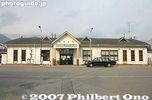
JR Sekigahara Station on the Tokaido Line 東海道線 関ヶ原駅
|
|

What the horse sees inside the narrow starting gate.
|
|
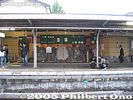
Kami-Suwa Station platform with hot spring foot bath
|
|

JR Fussa Station on the Ome Line. 福生駅
|
|

JR Kokubunji Station, South Entrance.
|
|

Kiyose Station on the Seibu Ikebukuro Line. Only about 23 min. from Ikebukuro Station in Tokyo.
|
|

Higashikurume Station on the Seibu Ikebukuro Line. On the far left is the Fujimi Terrace lookout deck. 東久留米駅
|
|

Chichibu Station on the Seibu Ikebukuro Line 西武池袋線 秩父駅
|
|

JR Sugamo Station on the Yamanote Line. 巣鴨駅
|
|

JR Gotanda Station, east entrance 五反田駅
|
|

Practice track
|
|

JR Sekigahara Station platform
|
|
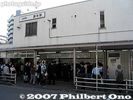
Chofu Station on the Keio Line 調布駅
|
|

JR Fussa Station connects to Seiyu
|
|

Inside Kokubunji Station
|
|

On the west side, Higashikurume Station has a lookout deck called Fujimi Terrace to view Mt. Fuji on clear days. 富士見テラス
|
|

Seibu Ikebukuro Line train at Chichibu Station
|
|

In front of JR Sugamo Station
|
|
|

Practice horse track at JRA Ritto Training Center in Ritto.
|
|

JR Sekigahara Station platform
|
|
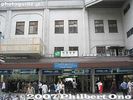
JR Akihabara Station
|
|
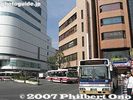
In front of Chofu Station
|
|

JR Fussa Station, North side
|
|

Inside Kokubunji Station
|
|

Always a crowd in front of JR Akihabara Station
|
|

Kiyose Station with overhead passge to Seiyu.
|
|

View of Fujimi-dori road from Fujimi Terrace. Unfortunately, too hazy to see Mt. Fuji. 「まろにえ富士見通り」
|
|

Chichibu Station platform on the Seibu Ikebukuro Line
|
|

JR Gotanda Station, east entrance 五反田駅
|
|
|

Battle of Sekigahara signboard at Sekigahara Station
|
|

JR Fussa Station, North side
|
|

Kokubunji Station, North Exit
|
|

Here's one reason for the crowd...
|
|

Higashikurume Station
|
|

Nakamise shopping arcade at Chichibu Station 仲見世
|
|

JR Gotanda Station as seen from Keihin Kyuko Gotanda Station.
|
|

The training track consists of several different tracks with grass, dirt, or wood chips.
|
|

Battle of Sekigahara signboard at Sekigahara Station, Eastern Forces
|
|

JR Fussa Station, South side
|
|

Kokubunji Station, North Entrance
|
|

And another one. Young pretty/cute girls in costume pass out flyers, but end up being street models for amateur photographers who have no girlfriends to shoot.
|
|

Chichibu Station
|
|

JR Gotanda Station, east side
|
|

Horse stable model
|
|

Battle of Sekigahara signboard at Sekigahara Station
|
|

JR Fussa Station, South side
|
|

Kokubunji Station, North side
|
|

They are happy to pose...
|
|

JR Gotanda Station, east side
|
|

Horse feed, mainly grain. No meats.
|
|

Battle of Sekigahara signboard at Sekigahara Station, Western Forces
|
|

JR Fussa Station
|
|

Shopping street near North side of Kokubunji Station
|
|

The maid costume is all the rage in Japan, for several years now.
|
|

JR Gotanda Station, east side
|
|

Swimming pool for horses. There is a circular pool and straight and narrow pools.
|
|

JR Fussa Station platform
|
|

Santa suit appears in Dec.
|
|

JR Gotanda Station, east side
|
|

Horse stables, newly constructed.
|
|

Horse stables.
|
|

JR Gotanda Station, east side
|
|
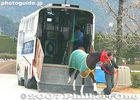
Unloaded a horse after a race. Horse trucks often arrived. One truck usually holds up to four horses.
|
|
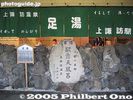
Hot spring foot bath
|
|
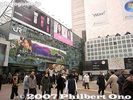
Shibuya Station, Hachiko Exit 渋谷駅 ハチ公口
|
|

Uphill training course with wood chips. 坂路調教馬場
|
|

Edo-Tokyo Museum
|
|

Shibuya Station, Hachiko Square
|
|

JR Gotanda Station, west side being completely redeveloped.
|
|

Uphill training course with observation building. The wood chips are soft, making the horse less prone to injury.
|
|
|
|

Train bridge
|
|

JR Gotanda Station, west side being completely redeveloped in April 2007.
|
|

Inside the observation building's press room.
|
|

Train bridge
|
|

The moat is parallel to the Chuo Line. View from Shin-Mitsuke Bridge. 新見附橋
|
|
|

Train bridge to Akihabara Station
|
|

Sobu Line passes through.
|
|

Senzoku-Ike Station on the Tokyo Ikegami Line. THe train line was built in 1928.
|
|

Nice view of uphill training course. The wood chips, which eventually wear out, are replaced once a year.
|
|

Sobu Line passes through.
|
|

Senzoku-ike station platform
|
|

View of track from press room.
|
|

Chuo Line passes through. 中央線
|
|

Tokyu Ikegami Line train
|
|

Starting gate on training track.
|
|
|
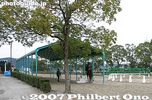
The tour includes a ride on a retired race horse.
|
|
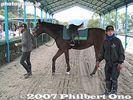
This one is named Meisho Ittetsu. メイショウ イッテツ
|
|

Photographers who love trains and cherries flock here.
|
|
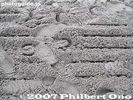
Hoof marks on sand.
|
|
|

Hot spring foot bathThat's not me in the picture.
|
|
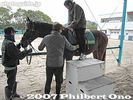
Horse ride.
|
|

JR Haijima Station being renovated in early 2007. 拝島駅
|
|

Keio Line Mogusaen Station 百草園駅
|
|
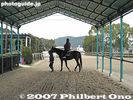
Horse ride with a guide guiding the horse.
|
|

Walking guide to Fussa at Haijima Station.
|
|

Mogusaen Station with plum decoration on top
|
|

No need to say giddy-up.
|
|

Haijima Station platform 拝島駅
|
|

Mogusaen Station platform
|
|
|

Keio Line train at Mogusaen Station
|
|
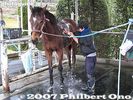
Washing a horse with warrm water.
|
|
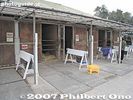
Horse stables.
|
|
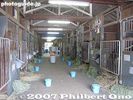
Horse stables.
|
|
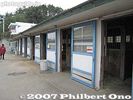
Horse stables.
|
|
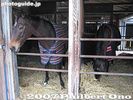
Horses in stable.
|
|

Unusual horse with a white face.
|
|

Onbashira rope on train platform
|
|
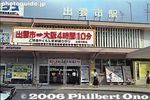
JR Izumo-shi Station in the 1990s.
|
|
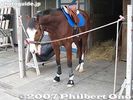
The left profile is brown.
|
|

Tehara Station on the JR Kustatsu Line. 手原駅 MAP
|
|

JR Oji Station on the Keihin-Tohoku Line
|
|
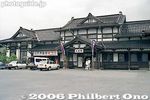
Taisha Station, closed in 1990 and preserved as an Important Cultural Property. 大社駅
|
|

Hi horsey!
|
|

Kuri-chan bus in front of Tehara Station.
|
|

Tokyo Toden streetcar at Oji Station, bound for Minowa-bashi.
|
|

JR Kumamoto Station at night.
|
|

In front of Tehara Station.
|
|

Staff living quarters
|
|

Toden streetcar leaving Oji Station
|
|
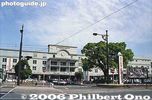
JR Kumamoto Station
|
|

Free gift given at the end of the tour: Pen, stapler, and ruler set. Very interesting tour even though you don't see any horses running on the track. (That's Wednesday's early morning tour.)
|
|
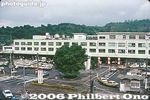
JR Kumamoto Station some years ago.
|
|

Onbashira rope on train platform
|
|
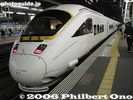
Express train to Nagasaki
|
|

They sing on the street to advertise something, usually a night club where they appear.
|
|
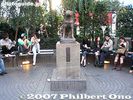
Shibuya Station, Hachiko statue
|
|
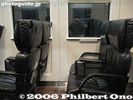
Inside train
|
|

The ever-popular maid outfit.
|
|

Shibuya Station, Hachiko statue
|
|
| 2288 files on 10 page(s) |
1 |
 |
 |
 |
 |
|